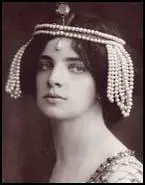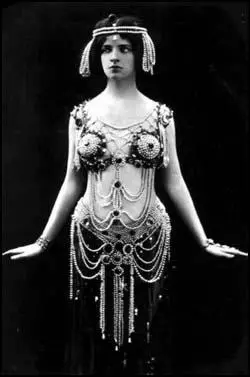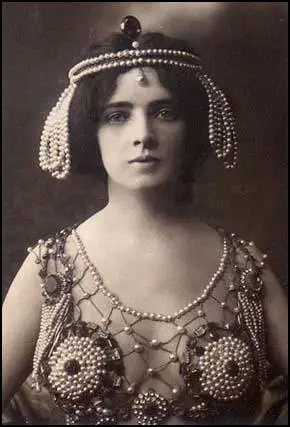Maud Allan

Beulah Maude Durrant (Maude Allan) was born in Toronto, Canada, on 27th August, 1873. The family moved to San Francisco in 1879 and she also spent time studying music in Berlin.
In 1895 her brother, Theodore Durrant, was charged with the brutal murders of Blanche Lamont and Minnie Flora Williams. He was executed on 7th January 1898. As a result of the case, she changed her name to Maude Allan.
In 1900 Allan published an illustrated sex manual for women. She also began to dance professionally. Inspired by Salomé, a play written by Oscar Wilde, she created Vision of Salomé. Its first production was in Vienna in 1906. Her Dance of the Seven Veils created great controversy. Allan promoted her career by publishing her autobiography, My Life and Dancing (1908).
In 1908 Allan took her production of Vision of Salomé to England. According to James Hayward, the author of Myths and Legends of the First World War (2002): "Allan had performed her dance with great success in London in 1908, its popular success due in large part to her voluptuous figure and revealing costume."
In an article that appeared in The Daily Mail on 3rd May, 1908, Allan argued: "The art of dancing, as understood by the great masses, is a series of regular rhythmical movements requiring a certain music; not so in my work. In that the movements of the plastic poser are inspired by the music.... What one usually only vaguely feels when listening to beautiful music I am trying, through movement and mimicry, to express clearly and deeply - the thought which seems to hover on the wings of the melody."
During the tour Allan was banned from appearing in Manchester: On 8th June 1908 the New York Times reported: "Miss Maud Allan, the barefooted and otherwise scantily clad dancer, in whose favor a very profitable boom has been worked up in London, and whose manager is anxious to give New Yorkers a chance of witnessing her Salome and other dances, has been warned off the stage in Manchester, which is the most important theatrical city in England outside of the capital."

After 250 performances in England she returned to the United States. Allan appeared at Carnegie Hall for the first time January, 1910. The New York Times reported: "Bare-limbed and scantily draped in filmy gauzes, diaphanous in texture and unvivid in colour, she floats from one pose to the next, emphasizing the plastic transitions with waving arms and raised legs and sundry poses of the head. Miss Allan in spirit and in the nature of her dances resembles her predecessors. However, she is more beautiful in face and figure than some of them, and she has a grace, a picturesque personal quality, which is all her own."
Allan embarked on a world tour and in 1915 she starred in the silent film, The Rug Maker's Daughter. When she arrived back in New York City in October 1916 a critic commented that the 43 year-old Allan had "succeeded in preserving the litheness of body desirable for this kind of dancing, and she has lost none of her grace". He went onto say that her dancing was "an art, no longer new, that depends on its novelty for popularity" and that this was reflected in the "scanty audience that greeted her yesterday."

Allan decided to return to London where she had so much success eight years earlier. In her previous visit she had made many enemies. This included Noel Pemberton Billing and Arnold Henry White, who had established the Vigilente Society, an organisation with the "object of promoting purity in public life". In December 1917, Billing published an article in The Imperialist by White that argued that Germany was under the control of homosexuals (White called them urnings): "Espionage is punished by death at the Tower of London, but there is a form of invasion which is as deadly as espionage: the systematic seduction of young British soldiers by the German urnings and their agents... Failure to intern all Germans is due to the invisible hand that protects urnings of enemy race... When the blond beast is an urning, he commands the urnings in other lands. They are moles. They burrow. They plot. They are hardest at work when they are most silent."
Billing and White had hears a rumour that Allan was having an affair with Margot Asquith, the wife of Herbert Asquith, the former prime minister. They believed all three were German agents. In The Imperialist Billing claimed the existence of a secret society called the Unseen Hand. As Ernest Sackville Turner, the author of Dear Old Blighty (1980) has pointed out: "One of the great delusions of the war was that there existed an Unseen (or Hidden, or Invisible) Hand, a pro-German influence which perennially strove to paralyse the nation's will and to set its most heroic efforts at naught... As defeat seemed to loom, as French military morale broke and Russia made her separate peace, more and more were ready to believe that the Unseen Hand stood for a confederacy of evil men, taking their orders from Berlin, dedicated to the downfall of Britain by subversion of the military, the Cabinet, the Civil Service and the City; and working not only through spiritualists, whores and homosexuals."
Relying on information supplied by Harold Sherwood Spencer, Billing published an article in The Imperialist on 26th January, 1918, revealing the existence of a Black Book: "There exists in the Cabinet Noir of a certain German Prince a book compiled by the Secret Service from reports of German agents who have infested this country for the past twenty years, agents so vile and spreading such debauchery and such lasciviousness as only German minds can conceive and only German bodies execute."
Noel Pemberton Billing claimed the book listed the names of 47,000 British sexual perverts, mostly in high places, being blackmailed by the German Secret Service. He added: "It is a most catholic miscellany. The names of Privy Councillors, youths of the chorus, wives of Cabinet Ministers, dancing girls, even Cabinet Ministers themselves, while diplomats, poets, bankers, editors, newspaper proprietors, members of His Majesty's Household follow each other with no order of precedence." Billing went onto argue that "the thought that 47,000 English men and women are held in enemy bondage through fear calls all clean spirits to mortal combat". The comment about "dancing girls" was a reference to Maud Allan.
In February, 1918, it was announced by theatrical producer, Jack Grein, that Maud Allan would give two private performances of Oscar Wildes's Salomé in April. It had to be a private showing because the play had long been banned by the Lord Chancellor as being blasphemous. Noel Pemberton Billing had heard rumours Allan was a lesbian and was having an affair with Margot Asquith, the wife of Herbert Asquith, the former prime minister. He also believed that Allan and the Asquiths were all members of the Unseen Hand.
On 16th February, 1918, the front page of The Vigilante had a headline, "The Cult of the Clitoris". This was followed by the paragraph: "To be a member of Maud Allan's private performances in Oscar Wilde's Salome one has to apply to a Miss Valetta, of 9 Duke Street, Adelphi, W.C. If Scotland Yard were to seize the list of those members I have no doubt they would secure the names of several of the first 47,000."
As soon as Allan became aware of the article she put the matter into the hands of her solicitor. In March 1918, Allan commenced criminal proceedings for obscene, criminal and defamatory libel. During this period Billing was approached by Charles Repington, the military correspondent of The Times. He was concerned about the decision by David Lloyd George to begin peace negotiations with the German foreign minister. According to James Hayward, the author of Myths and Legends of the First World War (2002): "Talk of peace outraged the Generals, who found allies in the British far right. Repington suggested that Billing get his trial postponed and use the mythical Black Book to smear senior politicians and inflame anti-alien feeling in the Commons. By this logic, the current peace talks would be ruined and Lloyd George's authority undermined."
Toni Bentley has argued in her book, Sisters of Salome (2002) that the government hired Eileen Villiers-Stuart to compromise Billing: "Lloyd George and his advisers hired a young woman with some experience in political subterfuge, as an agent-provocateur. She was to offer Pemberton-Billing her support, information, and sexual favours if necessary, and then lure him to a male brothel to be secretly photographed for blackmail. Eileen Villiers-Stewart was a political adventuress primed for the job. She was an attractive, twenty-five-year-old bigamist, and her lunch with the Independent M.P. was all too successful. By the end of the afternoon, mesmerized by him, she flipped her allegiance, slept with him, and divulged the Liberals' conspiracy to blackmail him. She even agreed to testify as a star witness in her new lover's libel case."
The libel case opened at the Old Bailey in May, 1918. Billing chose to conduct his own defence, in order to provide the opportunity to make the case against the government and the so-called Unseen Hand group. The prosecution was led by Ellis Hume-Williams and Travers Humphreys and the case was heard in front of Chief Justice Charles Darling.
Billing's first witness was Eileen Villiers-Stewart. She explained that she had been shown the Black Book by two politicians since killed in action in the First World War. As Christopher Andrew has pointed out in Secret Service: The Making of the British Intelligence Community (1985): "Though evidence is not normally allowed in court about the contents of documents which cannot be produced, exceptions may be made in the case of documents withheld by foreign enemies. Mrs Villiers Stewart explained that the Black Book was just such an exception." During the cross-examination Villiers-Stewart claimed that the names of Herbert Asquith, Margot Asquith and Richard Haldane were in the Black Book. Judge Charles Darling now ordered her to leave the witness-box. She retaliated by saying that Darling's name was also in the book.
The next witness was Harold S. Spencer. He claimed that he had seen the Black Book while looking through the private papers of Prince William of Wied of Albania in 1914. Spencer claimed that Alice Keppel, the mistress of Edward VII, was a member of the Unseen Hand and has visited Holland as a go-between in supposed peace talks with Germany. The prosecuting counsel, Travers Humphreys, asked Spencer what he meant when he said during cross-examination that "Maud Allan was administering the cult.... Will you tell the court exactly what you meant by that?" He replied: "Any performance of a play which has been described by competent critics as an essay in lust, madness and sadism, and is given and attracts people to it at from five guineas to ten guineas a seat, must bring people who have more money than brains; must bring people who are seeking unusual excitement, erotic excitement; and to gather these people together in a room, under the auspices of a naturalised alien (Jack Grein), would open these people to possible German blackmail, and that their names, or anything that transpires, might find their way into German hands, and these people would be blackmailed by the Germans; and it was to prevent this that the article was written."
Spencer then went onto to explain what he meant by the "Cult of the Clitoris". In reply to Travers Humphreys: "In order to show that a cult exists in this country who would gather together to witness a lewd performance for amusement during wartime on the Sabbath... The Cult of the Clitoris meant a cult that would gather together to see a representation of a diseased mad girl." Billing joined in the attack on Maud Allan: "Such a play.... is one that is calculated to deprave, one that is calculated to do more harm, not only to young men and young women, but to all who see it, by undermining them, even more than the German army itself."
On 4th June, 1918, Noel Pemberton Billing was acquitted of all charges. As James Hayward has pointed out: "Hardly ever had a verdict been received in the Central Criminal Court with such unequivocal public approval. The crowd in the gallery sprang to their feet and cheered, as women waved their handkerchiefs and men their hats. On leaving the court in company with Eileen Villiers-Stewart and his wife, Billing received a second thunderous ovation from the crowd outside, where his path was strewn with flowers."
Cynthia Asquith wrote in her diary: "One can't imagine a more undignified paragraph in English history: at this juncture, that three-quarters of The Times should be taken up with such a farrago of nonsense! It is monstrous that these maniacs should be vindicated in the eyes of the public... Papa came in and announced that the monster maniac Billing had won his case. Damn him! It is such an awful triumph for the unreasonable, such a tonic to the microbe of suspicion which is spreading through the country, and such a stab in the back to people unprotected from such attacks owing to their best and not their worst points." Basil Thomson, who was head of Special Branch, an in a position to know that Eileen Villiers-Stuart and Harold S. Spencer had lied in court, wrote in his diary, "Every-one concerned appeared to have been either insane or to have behaved as if he were."
Billing retained his seat at the 1918 General Election but with the end of the First World War he was seen as an irrelevance. His reputation was severely damaged when Eileen Villiers-Stuart admitted that the evidence she had given in the Maud Allan trial was entirely fictitious, and that she had rehearsed it with billing and Harold S. Spencer. Knowing that he faced defeat in the next election he retired in 1921 claiming he was too ill to continue.
Allan never returned to dancing and according to her biographer, by the outbreak of the Second World War "she was living in comparative poverty in a section of the West Wing, a large mansion on Regent's Park". After her house was damaged during the Blitz she returned to the United States.
Maude Allan died in a Los Angeles nursing home on 7th October 1956.
Primary Sources
(1) The New York Times (8th June, 1908)
Miss Maud Allan, the barefooted and otherwise scantily clad dancer, in whose favor a very profitable boom has been worked up in London, and whose manager is anxious to give New Yorkers a chance of witnessing her Salome and other dances, has been warned off the stage in Manchester, which is the most important theatrical city in England outside of the capital.
(2) Maud Allan, The Daily Mail (3rd May, 1908)
The art of dancing, as understood by the great masses, is a series of regular rhythmical movements requiring a certain music; not so in my work. In that the movements of the plastic poser are inspired by the music.... What one usually only vaguely feels when listening to beautiful music I am trying, through movement and mimicry, to express clearly and deeply - the thought which seems to hover on the wings of the melody.
(3) The New York Times (21st January, 1910)
Miss Maud Allan, an American girl, who has won no inconsiderable amount of fame in Europe and in England with her dances, made her initial appearance before a New York audience yesterday afternoon in Carnegie Hall. A large and very fashionable gathering greeted the dancer....
Bare-limbed and scantily draped in filmy gauzes, diaphanous in texture and unvivid in colour, she floats from one pose to the next, emphasizing the plastic transitions with waving arms and raised legs and sundry poses of the head. Miss Allan in spirit and in the nature of her dances resembles her predecessors. However, she is more beautiful in face and figure than some of them, and she has a grace, a picturesque personal quality, which is all her own.
